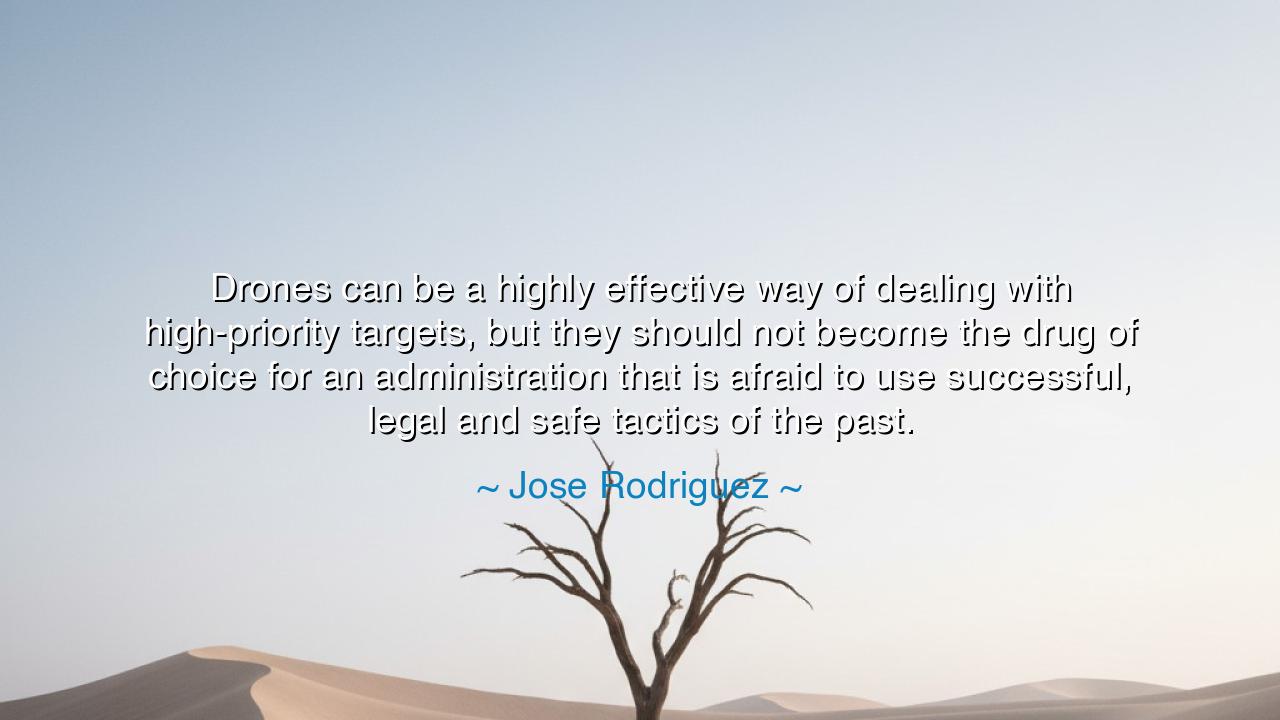
Drones can be a highly effective way of dealing with
Drones can be a highly effective way of dealing with high-priority targets, but they should not become the drug of choice for an administration that is afraid to use successful, legal and safe tactics of the past.






When Jose Rodriguez declared, “Drones can be a highly effective way of dealing with high-priority targets, but they should not become the drug of choice for an administration that is afraid to use successful, legal and safe tactics of the past,” he spoke not only as a man of intelligence and war, but as one who understood the peril of power untempered by discipline. His words are both a warning and a reflection — a reminder that even the most advanced tools of human creation can become addictive, dulling the moral judgment of those who wield them. In this single sentence, Rodriguez reveals the eternal struggle of mankind: the temptation to substitute wisdom with convenience, courage with technology, and prudence with speed.
The origin of this quote lies in Rodriguez’s experience as a senior CIA officer, a man who witnessed the rise of modern warfare’s most controversial weapon — the drone. He spoke from the perspective of one who had seen the old ways of intelligence, of covert operations and painstaking strategy, replaced by the cold precision of unmanned death from the sky. To him, drones were not evil; they were tools — sharp, efficient, and capable of justice when guided by reason. But when used excessively, they became a drug, numbing leaders to the complexity of warfare, diplomacy, and human consequence. His warning was directed at governments that had grown comfortable with killing from a distance, forgetting the discipline and humanity that once defined moral warfare.
Rodriguez’s insight draws from an ancient truth: that power without restraint leads to decay. The Roman philosopher Seneca once wrote, “No man becomes cruel all at once.” So too, no nation loses its virtue in an instant — it happens through small compromises made in the name of safety and expedience. Drones, in this sense, symbolize more than military power; they represent the seductive ease of technology itself. In every age, empires have sought to replace courage with machinery, but the wise have always known that tools cannot replace the moral hand that wields them. The sword, the cannon, the missile — and now the drone — each promise control, yet each can erode conscience if not tempered by wisdom.
History offers countless echoes of this warning. In the twilight of the Roman Empire, emperors relied increasingly on mercenaries and distant warfare to maintain control, abandoning the discipline of Roman legions that had once forged the Republic’s might. The result was the slow corruption of Rome’s military soul — battles fought without honor, victories won without valor, and a people grown complacent in the illusion of strength. Rodriguez’s message mirrors this lesson: when leaders grow dependent on methods that spare them risk, they forget the moral cost of command. A nation that fights only through machines may preserve its soldiers, but it endangers its humanity.
His choice of words — “the drug of choice” — is especially telling. A drug brings relief, but it also brings dependence. It dulls pain, but it weakens resolve. Likewise, the reliance on drones provides the illusion of control — the ability to strike without consequence — yet it feeds a deeper weakness: the fear of accountability and the avoidance of difficult decisions. Rodriguez urges us to remember that true leadership demands engagement, not avoidance; courage, not comfort. The “legal and safe tactics of the past” he mentions are not just military strategies, but ethical principles — intelligence gathering, diplomacy, human contact — the very elements that connect justice to compassion.
In the broader sense, Rodriguez’s words speak not only to governments but to all individuals living in an age of convenience. We, too, are surrounded by our own “drones” — technologies that make life easier but threaten to erode patience, empathy, and courage. Every tool that removes struggle also removes growth. Just as nations risk losing their moral compass through remote warfare, individuals risk losing their souls through the constant pursuit of ease. The true warrior — whether in battle or in life — must learn to wield power with awareness, to embrace the difficulty that keeps the spirit strong.
Let this then be the lesson carried forward: that every generation must choose between the comfort of convenience and the integrity of effort. Tools, no matter how advanced, are only as noble as those who use them. Drones may strike swiftly, but justice requires understanding; machines may deliver victory, but only wisdom sustains peace. As Jose Rodriguez teaches, technology without virtue is peril, and leadership without courage is ruin. Therefore, let us remember the old ways — the human ways — where valor, law, and conscience stood above expedience. For when nations and souls alike abandon discipline for ease, they may win their battles — but they will lose their honor.






AAdministratorAdministrator
Welcome, honored guests. Please leave a comment, we will respond soon